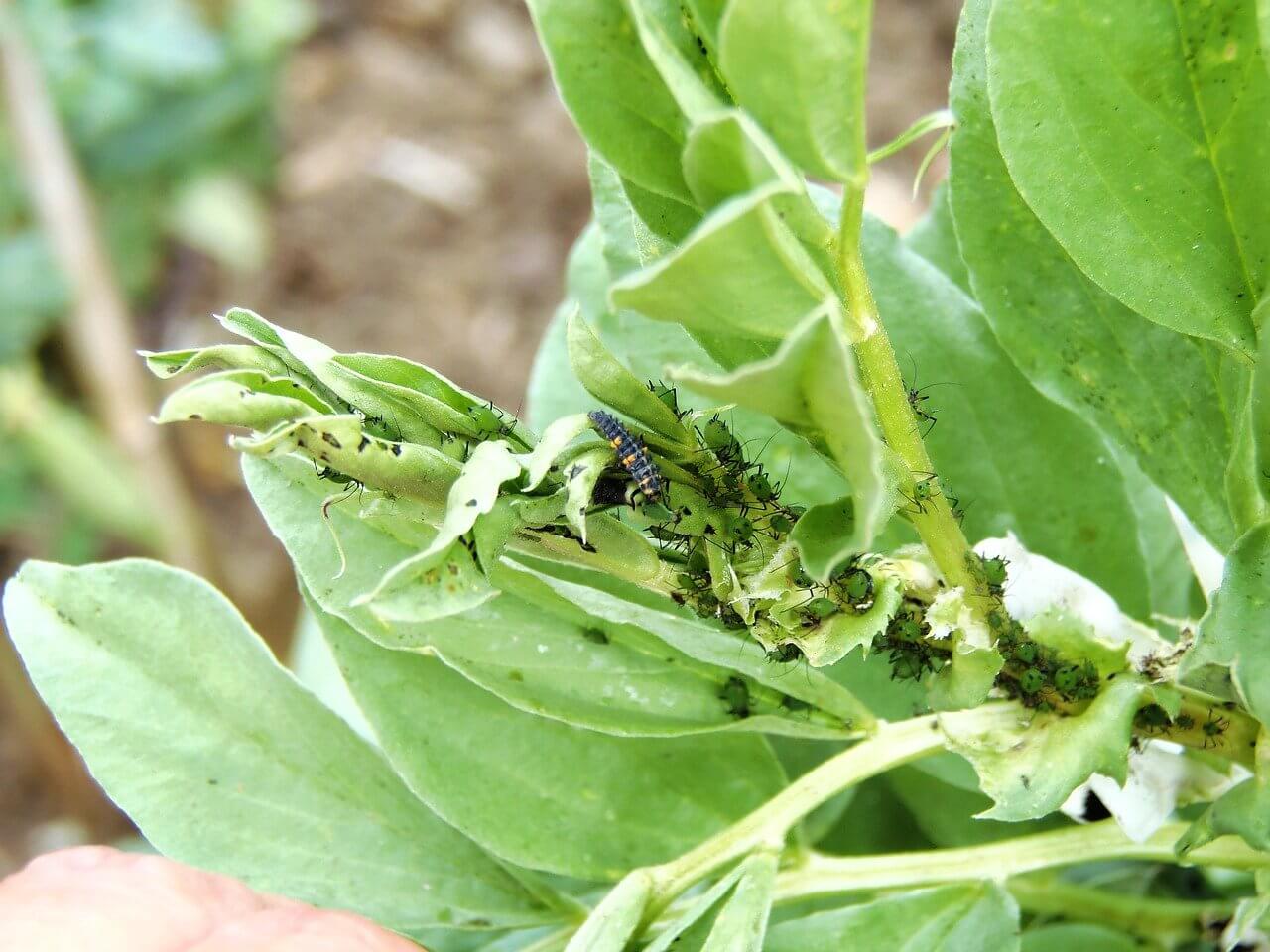Blackfly are the bane of many gardeners’ lives. They can decimate a broad bean crop, and even if they don’t completely destroy it they are unsightly and, well, a bit gross! You want to know how to get rid of blackfly on broad beans? Most of us do, so we have uncovered a few good ways to keep your broad beans safe from any invaders!
What are blackfly?

These tiny, dark coloured pests are actually a type of aphid. Also known as the Black Bean Aphid, they love a range of garden plants, including broad, runner and French beans, dahlias and nasturshiums.
They are tiny, only measuring up to 2mm, but they can inflict a lot of damage very quickly, by munching on a plant’s young tender shoots. There a a few different types of blackfly, and pretty much all of them will damage your beans.
They breed very quickly, meaning that one or two can quickly turn into millions. Blackfly feed on sap, and excrete a sugary dew that ants love, so you might end up with an ant invasion as well as the blackfly!
Luckily ants won’t damage your plants like blackfly will, but you still don’t want too many of them crawling around your garden.
What damage can blackfly do?
An infestation of blackfly can absolutely decimate a crop of broad beans. They generally arrive in the spring, after which they multiply like crazy.
Because they feed on the young shoots, the new growth of the plant is affected, and even the production of the bean pods themselves can be much less if you have an infestation, because the plant will have been so stressed by the blackflies.
Blackfly damage any plant they land on, but they love broad beans so much that it is worth looking up ways to get rid of them if you have a freshly planted crop that you want to keep healthy and hopefully harvest some good beans from.
Why do blackfly love broad beans?
The tops of the new shoots, which is where you find the biggest clusters of blackfly, are younger and therefore sweeter than the older parts of the plant.
Blackfly love to suck the sap from the tender new shoots of broad beans, which is why you will most often find them on your carefully cultivated, newly planted young plants.
How to get rid of blackfly on broad beans?
1. Plant your broad beans in winter
One of the best ways to prevent a blackfly infestation is to plant your broad beans in winter. Plants that have been put into the ground during the cold months, rather than waiting for spring, seem to fare better at keeping blackfly off. No one really knows why this is, and it is not a completely fail safe method, but it does help to keep them away.
2. Remove them from the plant
As soon as you start to notice those telltale black spots, you should remove them from the plant – this is as easy as running your finger and thumb down the stem, and squishing the little insects. This works best at the very first signs of the problem, and will be less effective as the blackflies multiply.
3. Pinch the tips off your plants
You can pinch the tips off your plants to reduce the possibility of blackfly invasions. These young shoots are the bean aphid’s favourite, so taking them off will reduce the problem without damaging the plant.
4. Employ ladybirds
Blackfly’s natural predators are ladybirds, so you could go down the nematode route and introduce these red and black spotted insects to try to control your problem – but you will need a lot of them, particularly if the infestation is a large one.
5. Companion planting
Companion planting has been seen to be effective – nasturshiums in particular are attractive to blackfly, so you could try planting a bed of nasturshiums beside your broad beans, to try to entice the insects to eat these rather than your precious crop.
6. Try garlic or few drops of washing up liquid
Mixing water with a few drops of washing up liquid, then spraying the mixture onto your plants, can work wonders at destroying blackfly. You can also soak a few cloves of garlic in water then spray this on, but you will need to rinse the leaves off afterwards, as the garlic can burn the plant.
7. Chemical protection
As a last resort, you can buy chemical sprays to remove the blackfly problem, but it really is better for the health of your garden and your plants if you can avoid using harsh, artificial chemicals.
This video shows you some of the best way to get rid of blackfly on your broad beans:
What to do with broad beans that have blackfly?
If you are lucky enough to get any sort of bean crop from plants that have been affected by blackfly, you can still use them in the same way as unaffected beans – but be aware that they may be smaller and less well developed. The plants themselves should be dug up and burnt, to prevent any further breeding of the blackflies.
Final words
It can be a real worry to spot blackfly on your broad bean plants – but it doesn’t have to be the end of the world. If you catch it early you can prevent the insects from taking over – and even if you leave it too late there are still many ideas for how to get rid of blackfly on broad beans.






I’ve had problems with broad beans and was very grateful for your video/Youtube. However, in one of your photos you has a picture of a very small black insect with two or three RED LINES. I had that insect on my broad beans this weekend together with the obvious black fly. I’ve looked it up on the net and also in my insect book…nothing tells me what that creature is! Yours is the only picture that I’ve seen of it. Is it another version of black fly or what? Does it sting?!
I used washing up liquid – plus “something else”; they have worked and I’ve also snipped off the tops as you said…Thanks for the advice BUT…WHAT ABOUT THAT LITTLE BLACK & RED CREATURE? A friend also found one on some flowers. It’s not a ladybird larva is it?